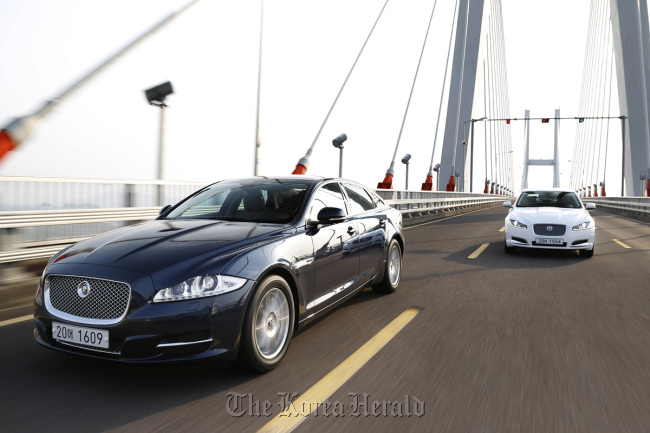Namhae ― Dieting is all the rage among luxury carmakers today, from slimmed-down bodies to smaller engines. Jaguar’s take on the trend was to put the 2.0-liter turbocharged four-cylinder petrol engine from the Range Rover Evoque into its flagship XJ sedan.
The British luxury carmaker, whose presence has been growing recently in Korea, believes the lighter, cheaper engine lineup ― priced at 190 million won ($175,000) ― will enable it to access new customers. (Korea is the fourth-largest market for the XJ globally.)
During a test-drive held Thursday at the picturesque island of Namhae, some 500 kilometers south from Seoul, I had the privilege of slipping into the cabin of the latest XJ, a 2.0-liter petrol luxury model.
 |
The 2.0-liter petrol Jaguar XJ (left) and the XF sports sedan. (Jaguar Land Rover Korea) |
The carmaker had apparently made little design changes in its flagship of more than 40 years. Especially the interior, largely inspired by a luxury yacht, ranks among the most elegant in the industry.
To create an ambiance of being on board a yacht, the cabin is trimmed with wood. Where there isn’t wood, leather is the word, covering the headliner, the door posts, the dashboard, right up to the backs and sides of the seats and the center console.
When the car started and the shift dial rose up from the console, I frankly had doubts about driving the limousine-like vehicle on the narrow country roads.
But toward the end of the drive, I had to give it to the XJ for expertly handling the hilly course.
The car’s distinctive all-aluminum chassis significantly reduced the car’s weight, while the lighter engine ― 130 kilograms ― offered a more balanced performance through twists and turns. The steering was light and sharp.
The turbo engine seemed to lag at the bottom end but once on boost, it revved up powerfully. Compared to the Standard driving mode, the Dynamic setting offered a sportier feel improving the driving experience richly.
With all the driving and design virtues of an XJ remaining almost the same, the car price has become more affordable, said David McIntyre, CEO of Jaguar Land Rover Korea, admitting he also had had some doubts about the 2.0-liter petrol engine before driving the car himself.
“It’s a good opportunity to own an XJ at a more reasonable price. We will diversify engine lineups more to attract more potential customers,” he said. “For existing owners of luxury cars, Jaguar would be a next step-up.”
According to the carmaker, the new model, equipped with a 240-horsepower engine, hustles to 100 kilometers per hour within 7.5 seconds. It has a fuel economy rating of 8.1 kilometers per liter in town, 11.9 on the highway.
Starting with the 2013 models, the Jaguar audio system, previously supported by Bowers & Willkins, has been replaced with an exclusive 15-channel, 20-speaker surround sound system from Meridian, which the carmaker said would better support digitalized music files.
The Korean unit of Jaguar sees some 20 percent of its customers choose the 2.0 petrol version, which went on sale in January here.
Jaguar Land Rover sold a record 3,113 cars in Korea last year, with Jaguar and Land Rover brands posting 17.8 percent and 38.5 percent sales growth, respectively, compared to 2011.
The Korean chief predicted this year’s growth would likely outpace the 10 percent growth projection of the nation’s import car market overall.
By Lee Ji-yoon (
jylee@heraldcorp.com)








![[Today’s K-pop] Blackpink’s Jennie, Lisa invited to Coachella as solo acts](http://res.heraldm.com/phpwas/restmb_idxmake.php?idx=644&simg=/content/image/2024/11/21/20241121050099_0.jpg)